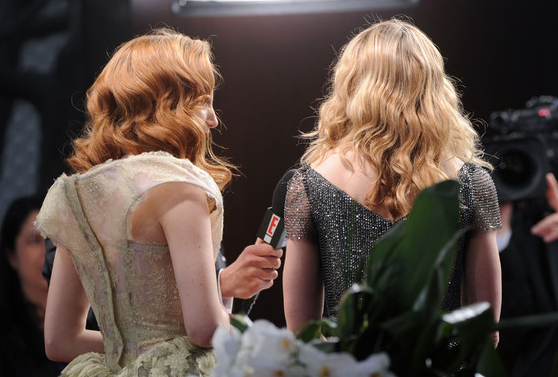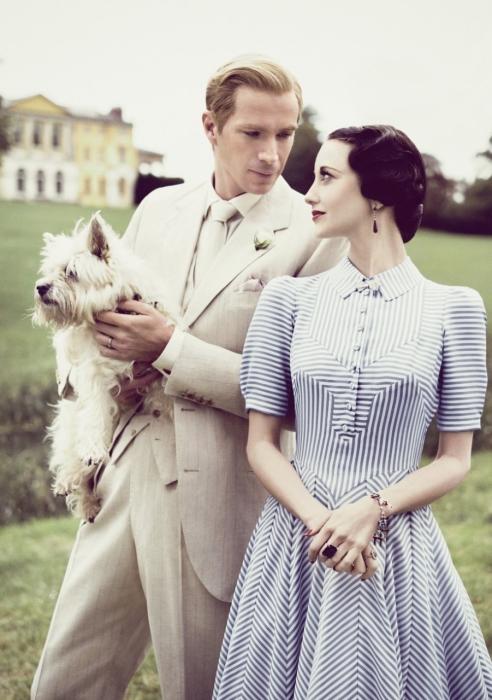I don't normally attend roundtable interviews since there's little you can do about every other article on the person having the exact same quotes but to finally meet Madonna (on the W.E. campaign trail) it was worth it. When we were done with the Queen, Andrea Riseborough breezed into the room. It's been pretty clear on the promotional trail that Andrea and Madonna get along famously. (Andrea describes their relationship as "artistically complicit.") She's one of those actresses that totally seizes your attention onscreen, but you might actually walk right by her on the street without noticing her. She's a tiny slip of a thing who comes fully alive on the screen through some sort of magical alchemy with the camera.
 Andrea and Madonna, artistically and sartorially complicit at the Globes
Andrea and Madonna, artistically and sartorially complicit at the Globes
Not that she isn't engaging in person. The thirty-year old rising star was erudite, thoughtful and talked a mile a minute, each question setting off a flurry runaway train of thought. Upon entering the room a reporter bizarrely asked her who she was wearing though no red carpet was anywhere in sight. Riseborough, rolling with the odd start, spun her head a bit as she took her seat.
"You almost made me do that thing in Death Becomes Her where she turns her head around," she said bemused. (Alberto Ferretti if you must know.)
 She talked a lot about the film's aesthetic, Wallis Simpson's own aesthetic, humorously blaming Wallis for being one of those women who forced actresses into near androgyny with expectations of rail-thinness. "'You can't be too rich or too thin' was such an honest statement but also she was sending her own frivolity up. But also she had terrible stomach ulcers. Work with what you got. Make the absolute best of what is there. Because really you can work a lot. And at times she had very little. She looked virtually anorexic. She was ill really. So she made it chic. She was very pragmatic in that way."
She talked a lot about the film's aesthetic, Wallis Simpson's own aesthetic, humorously blaming Wallis for being one of those women who forced actresses into near androgyny with expectations of rail-thinness. "'You can't be too rich or too thin' was such an honest statement but also she was sending her own frivolity up. But also she had terrible stomach ulcers. Work with what you got. Make the absolute best of what is there. Because really you can work a lot. And at times she had very little. She looked virtually anorexic. She was ill really. So she made it chic. She was very pragmatic in that way."
After the jump: Andrea on the Oscar nominated costumes and answering my question about dancing FOR Madonna...
On the movies Oscar-nominated costumes, she gets rhapsodic.
"I can only speak from the perspective of being my own tool: my physical body and my brain and emotions are my tools. From my perspective as an actor, they were invaluable. I had perhaps more than 60 costumes changes. I understand the architecture of couture in a way I previous -- I had nowhere near enough respect for -- the constraint, and the symmetry and the androgyny, often, of the costumes only served to enhance everything that was going on internally. Truly they were the external manifestations of what she felt inside. It may seem like frivolity but at the time when your goal was to fulfill your role as a wife and a mother… . she couldn't do the mothering part so she absolutely did the wife to death. She would look impeccable and a dinner party she wouldn't eat for a week in order to be able to give a dinner party to perhaps benefit his career for example."
When I finally got a word in I had to ask her about her two dancing scenes. They're stand out scenes in the movie but I couldn't imagine, as an actor, dancing for Madonna, who is rather an icon of just that.
"I always feel like an alien when people ask me questions like this," she began, and she was off on another rapid train of thought. "I wasn't scared. I don't mean to say that in an arrogant way. It's just not the way I operate. Maybe I feel genuinely like an alien in that scenario. I've never been paralyzed by fear artistically. Believe me I've been paralyzed by fear in other areas of my life. We all are. Something I've come to understand, and it's a short way into my career, but I already feel this strongly: fear is a fickle friend. It seems to be a huge compelling force and a great motivator but actually I would prefer to operate from a place of my heart being as open as possible. Absorb everything and let it all go... trust that it's there and be present and live out somebody else's life, or what might have been somebody else's life and that is just the most extraordinary privilege.
I know i'm giving you a weighted answer to a very lovely and light question and a valid one. It was hedonistic and liberating and extraordinary fun. The first dance sequence was exactly that. If I had been thinking about anything other I would not have been doing my job. That's how I feel."

This fearlessness is also evident in her response to another question about the other Wallis Simpson performances that preceded hers. How much did they factor into her work?
"Not at all. Not at all. Not at all." she recites before the reporter is even done with the question. The only thing she concentrates on is the role itself and what the director wants from her. "Whoever that is and whatever they want is what I'm looking to deliver." A short pause follows.
"Perhaps I need a lot of affirmation. Who knows? But I do like to please." she says, laughing.
One of the roles she's most well known for to date is her BAFTA nominated performance as Margaret Thatcher, which she played before Meryl Streep in a TV film. And she recalls that performance while talking about the difficult demands of playing Wallis Simpson, and any biographic performance that stretches over a long period of time.
 Andrea Riseborough as Margaret Thatcher in 2008"Nothing is ever sequential. I've said it once before when i was playing thatcher." You get up. You have breakfast. You're 60. You're 20. You give birth. You die. You have lunch. And after lunch you're 15 and that's how your day goes on. You have to have a very clear handle on the narrative and more importantly the emotional place you're in at each given moment. Within those moments you have to forget. So, you can't be thinking '1946 1946 1946' throughout the scene because you just have to be as she was emotionally at that time."
Andrea Riseborough as Margaret Thatcher in 2008"Nothing is ever sequential. I've said it once before when i was playing thatcher." You get up. You have breakfast. You're 60. You're 20. You give birth. You die. You have lunch. And after lunch you're 15 and that's how your day goes on. You have to have a very clear handle on the narrative and more importantly the emotional place you're in at each given moment. Within those moments you have to forget. So, you can't be thinking '1946 1946 1946' throughout the scene because you just have to be as she was emotionally at that time."

Related
Riseborough medalled right here last year for her cameo in Never Let Me Go
Recent Interviews
Charlize Theron | Corey Stoll | Jessica Chastain | Index